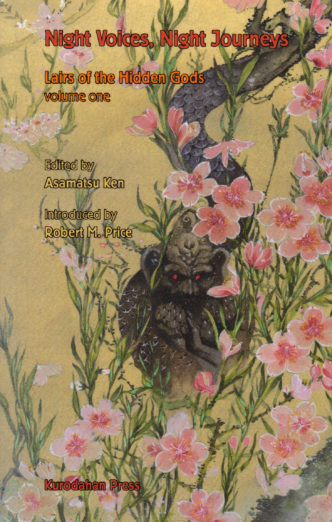 Edited By ASAMATSU KEN (Kurodahan Press; 2002/05)
Edited By ASAMATSU KEN (Kurodahan Press; 2002/05)
Here we have the first entry of a four volume English translation of this massive H.P. Lovecraft-inspired anthology, which initially appeared in Japan back in 2002. Specifically, the stories are centered on Lovecraft’s Cthulhu Mythos.
The Cthulhu mythos have of course spawned a seemingly neverending succession of English language stories and novels, and are apparently quite popular in Japan as well. A concluding nonfiction piece by Yonezawa Yoshihiro attests to this, exhaustively chronicling the innumerable manga inspired by the mythos.
In his introduction, Robert M. Price acknowledges the incongruity of Japanese writers taking on Mythos-related subject matter, given Lovecraft’s well-known abhorrence of the “Asiatic hordes, winking to alien god and devil.” Yet the dedication and enthusiasm this collection of writers evince toward the particulars of Lovecraft’s mythology is undeniable—even if they occasionally wreak some perverse twists that probably wouldn’t please the famously puritanical Lovecraft. I’m referring in particular to Makino Osamu’s “Necrophallus,” a freaky psychosexual take on the mythos, and Shibata Yoshiki’s “Love for he who Speaks,” a love triangle involving a dissatisfied woman, her distant husband and a strangely seductive sea creature.
The book’s editor Asamatsu Ken provides the novella length “Plague of St. James Infirmary,” a tale set in Chicago during the 1920s, headlined by a young Eliot Ness and featuring a supporting turn by Al Capone. The elements of the tale—including reality warping, zombies and a giant monstrosity made of water—are bizarre, and all the more so because of the subdued, unemotional prose that never raises its voice no matter how outrageous the proceedings become.
Two other tales, Yamada Masaki’s “Import of Tremors” and Kamino Okina’s “27 May 1945,” are notable for their gritty WWII-era settings: the hunger, despair and sheer desperation that gripped Japan during the time are all evoked with disquieting vividness that resonates every bit as much as the supernatural business.
The title story by Inoue Masahiko uses the imagery of the Cthulhu mythos in service of a dreamlike reverie of desire and sorcery that explicitly references not only Lovecraft but also J.G. Ballard. It’s among the book’s standout entries. “Sacrifice” by Murata Motoi is another standout, with its cthuloid horrors taking place in a most unlikely setting: a garden!
The English translations of these tales, as I’ve come to expect from Kurodahan Press, are uniformly top notch. For Lovecraft enthusiasts this a publication of obvious interest, but it’s also ideal for horror buffs of any stripe—even those who (like me) have largely grown tired of the mythos, as NIGHT VOICES, NIGHT JOURNEYS is an altogether unique and culturally specific but still readable and user-friendly take on familiar subject matter.
